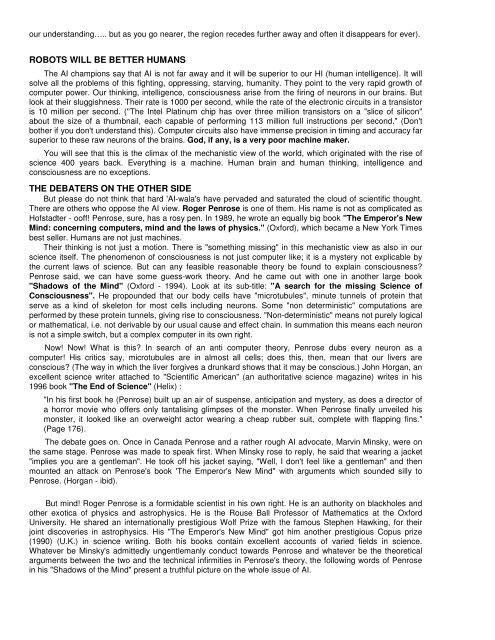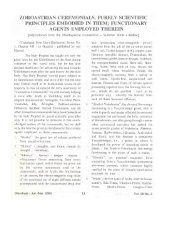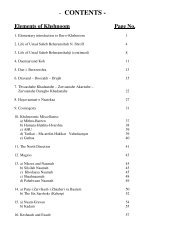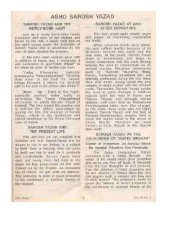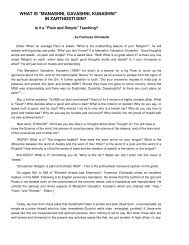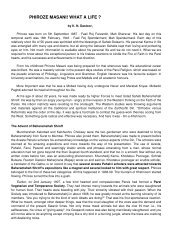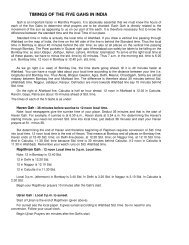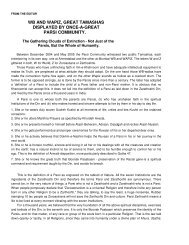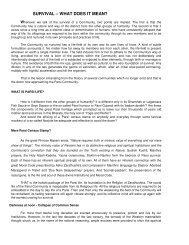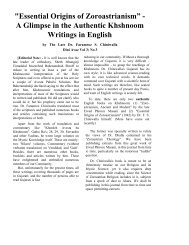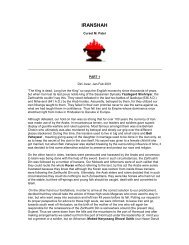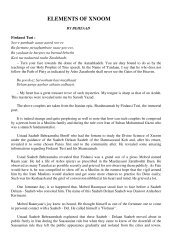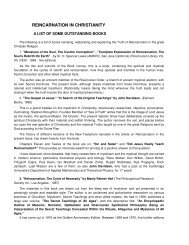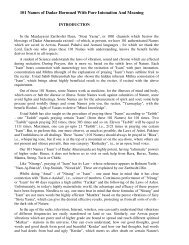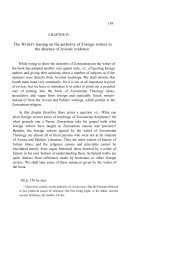(AI) Debate - Traditional Zoroastrianism: Tenets of the Religion
(AI) Debate - Traditional Zoroastrianism: Tenets of the Religion
(AI) Debate - Traditional Zoroastrianism: Tenets of the Religion
You also want an ePaper? Increase the reach of your titles
YUMPU automatically turns print PDFs into web optimized ePapers that Google loves.
our understanding….. but as you go nearer, <strong>the</strong> region recedes fur<strong>the</strong>r away and <strong>of</strong>ten it disappears for ever).<br />
ROBOTS WILL BE BETTER HUMANS<br />
The <strong>AI</strong> champions say that <strong>AI</strong> is not far away and it will be superior to our HI (human intelligence). It will<br />
solve all <strong>the</strong> problems <strong>of</strong> this fighting, oppressing, starving, humanity. They point to <strong>the</strong> very rapid growth <strong>of</strong><br />
computer power. Our thinking, intelligence, consciousness arise from <strong>the</strong> firing <strong>of</strong> neurons in our brains. But<br />
look at <strong>the</strong>ir sluggishness. Their rate is 1000 per second, while <strong>the</strong> rate <strong>of</strong> <strong>the</strong> electronic circuits in a transistor<br />
is 10 million per second. (''The Intel Platinum chip has over three million transistors on a "slice <strong>of</strong> silicon"<br />
about <strong>the</strong> size <strong>of</strong> a thumbnail, each capable <strong>of</strong> performing 113 million full instructions per second." (Don't<br />
bo<strong>the</strong>r if you don't understand this). Computer circuits also have immense precision in timing and accuracy far<br />
superior to <strong>the</strong>se raw neurons <strong>of</strong> <strong>the</strong> brains. God, if any, is a very poor machine maker.<br />
You will see that this is <strong>the</strong> climax <strong>of</strong> <strong>the</strong> mechanistic view <strong>of</strong> <strong>the</strong> world, which originated with <strong>the</strong> rise <strong>of</strong><br />
science 400 years back. Everything is a machine. Human brain and human thinking, intelligence and<br />
consciousness are no exceptions.<br />
THE DEBATERS ON THE OTHER SIDE<br />
But please do not think that hard '<strong>AI</strong>-wala's have pervaded and saturated <strong>the</strong> cloud <strong>of</strong> scientific thought.<br />
There are o<strong>the</strong>rs who oppose <strong>the</strong> <strong>AI</strong> view. Roger Penrose is one <strong>of</strong> <strong>the</strong>m. His name is not as complicated as<br />
H<strong>of</strong>stadter - o<strong>of</strong>f! Penrose, sure, has a rosy pen. In 1989, he wrote an equally big book "The Emperor's New<br />
Mind: concerning computers, mind and <strong>the</strong> laws <strong>of</strong> physics." (Oxford), which became a New York Times<br />
best seller. Humans are not just machines.<br />
Their thinking is not just a motion. There is "something missing" in this mechanistic view as also in our<br />
science itself. The phenomenon <strong>of</strong> consciousness is not just computer like; it is a mystery not explicable by<br />
<strong>the</strong> current laws <strong>of</strong> science. But can any feasible reasonable <strong>the</strong>ory be found to explain consciousness?<br />
Penrose said, we can have some guess-work <strong>the</strong>ory. And he came out with one in ano<strong>the</strong>r large book<br />
"Shadows <strong>of</strong> <strong>the</strong> Mind" (Oxford - 1994). Look at its sub-title: "A search for <strong>the</strong> missing Science <strong>of</strong><br />
Consciousness". He propounded that our body cells have "microtubules", minute tunnels <strong>of</strong> protein that<br />
serve as a kind <strong>of</strong> skeleton for most cells including neurons. Some "non deterministic" computations are<br />
performed by <strong>the</strong>se protein tunnels, giving rise to consciousness. "Non-deterministic" means not purely logical<br />
or ma<strong>the</strong>matical, i.e. not derivable by our usual cause and effect chain. In summation this means each neuron<br />
is not a simple switch, but a complex computer in its own right.<br />
Now! Now! What is this? In search <strong>of</strong> an anti computer <strong>the</strong>ory, Penrose dubs every neuron as a<br />
computer! His critics say, microtubules are in almost all cells; does this, <strong>the</strong>n, mean that our livers are<br />
conscious? (The way in which <strong>the</strong> liver forgives a drunkard shows that it may be conscious.) John Horgan, an<br />
excellent science writer attached to "Scientific American" (an authoritative science magazine) writes in his<br />
1996 book "The End <strong>of</strong> Science" (Helix) :<br />
"In his first book he (Penrose) built up an air <strong>of</strong> suspense, anticipation and mystery, as does a director <strong>of</strong><br />
a horror movie who <strong>of</strong>fers only tantalising glimpses <strong>of</strong> <strong>the</strong> monster. When Penrose finally unveiled his<br />
monster, it looked like an overweight actor wearing a cheap rubber suit, complete with flapping fins."<br />
(Page 176).<br />
The debate goes on. Once in Canada Penrose and a ra<strong>the</strong>r rough <strong>AI</strong> advocate, Marvin Minsky, were on<br />
<strong>the</strong> same stage. Penrose was made to speak first. When Minsky rose to reply, he said that wearing a jacket<br />
"implies you are a gentleman". He took <strong>of</strong>f his jacket saying, "Well, I don't feel like a gentleman" and <strong>the</strong>n<br />
mounted an attack on Penrose's book 'The Emperor's New Mind" with arguments which sounded silly to<br />
Penrose. (Horgan - ibid).<br />
But mind! Roger Penrose is a formidable scientist in his own right. He is an authority on blackholes and<br />
o<strong>the</strong>r exotica <strong>of</strong> physics and astrophysics. He is <strong>the</strong> Rouse Ball Pr<strong>of</strong>essor <strong>of</strong> Ma<strong>the</strong>matics at <strong>the</strong> Oxford<br />
University. He shared an internationally prestigious Wolf Prize with <strong>the</strong> famous Stephen Hawking, for <strong>the</strong>ir<br />
joint discoveries in astrophysics. His "The Emperor's New Mind" got him ano<strong>the</strong>r prestigious Copus prize<br />
(1990) (U.K.) in science writing. Both his books contain excellent accounts <strong>of</strong> varied fields in science.<br />
Whatever be Minsky's admittedly ungentlemanly conduct towards Penrose and whatever be <strong>the</strong> <strong>the</strong>oretical<br />
arguments between <strong>the</strong> two and <strong>the</strong> technical infirmities in Penrose's <strong>the</strong>ory, <strong>the</strong> following words <strong>of</strong> Penrose<br />
in his "Shadows <strong>of</strong> <strong>the</strong> Mind" present a truthful picture on <strong>the</strong> whole issue <strong>of</strong> <strong>AI</strong>.


